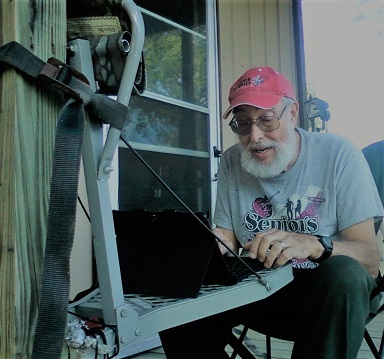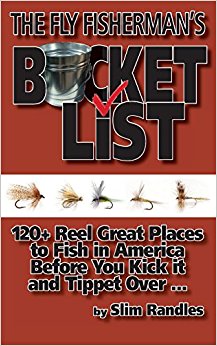Today I interview Slim Randles, and we get to know a few things about the writer behind all those great stories he shares with us here about the guys at the Mule Barn Truck Stop. I hope you enjoy the visit with Slim.
By the way, in this picture Slim is writing a story for Outdoor Life magazine on the porch of a hunting cabin in SE Oklahoma. “No table, so I’m using a tree-stand for a desk. My buddy, Jeff Johnston, is a famous outdoor writer, and this was his ranch and cabin. Not only did I get a great hunt out of this, but he got me the gig with Outdoor Life!”

When did you first get the idea of writing the Home Country columns? How long have they been running, and in how many newspapers?
I first got the idea of writing the Home Country columns back when I was managing editor of a six-day daily in Texas, The Pampa News. I wanted it to be short, non-controversial, fun, fiction and free to the papers. When I left my job as columnist for The Albuquerque Journal (17 years later) I decided to give it a shot. This is now our 16th year, and the column appears in 452 newspapers with a combined readership of over 3.9 million.
(We also have an hour-long radio show called Home Country and we’re on 75 stations now)
Did the series start with the same characters that show up in the stories today; Doc and Steve and Windy?
It didn’t start with Windy, but Doc and Steve and Dud and those guys, yes. Windy came along a few years later, with the advent of our radio show, also called Home Country. Windy is a guy who’s often in error, but never in doubt. I’ve known more than a dozen of them over the years, and I have a bunch of fun writing and portraying Windy.
I seem to recall one of your columns dealt with the Iditarod in Alaska. Tell us about your first time to participate.
I competed only once. My ex-wife Pam and I were up to our ears in the Iditarod. We helped Joe Redington get it started, actually, and I laid out some of the trail. Pam was the first paid employee of the race, because she ran race headquarters in Anchorage and kept track of every musher on the trail. I borrowed two dogs so I would have the requisite minimum of seven and ran the first race, in 1973. I got 300 miles in and crushed an ankle and the army airlifted us out. For the next five years, I was a race official. No money, but that was okay.
I was also the color man for tv and radio at the start and finish of the race. Long, cold camping trip but lots of fun.
The second year, by the way, they upped the minimum to nine dogs, making me the only musher dumb enough to start the race so underdogged. I’m still known in mushing circles as Seven-Dog Slim.
What was the most interesting time you had backpacking and taking people on trail rides?
I was never a backpacker, but a mule packer. I worked for Sequoia-Kings Pack Trains in the eastern High Sierra for eight summers. Great job. Very little money, but hey … people paid me to ride a horse around those beautiful mountains all summer. Not a bad deal.
Perhaps the most interesting time was when I was called upon to bring out the bodies of two college boys who were climbing the east face of Mount Whitney. It was a mess. I was 16 years old and had never seen a dead person before. Very traumatic for me. But most of the memorable times were fun. I tend to remember them the most … deliberately.
Tell us a little about your writing career. How it started. Was it with the Home Country columns or with one of your books?
Oh no, not then. I began as a weekly columnist for my hometown paper, the El Monte (CA) Press when I was fifteen. That would’ve been 1957 or thereabouts. It was called “Chutin’ the Bull” and was about rodeo and the people who competed. I competed, too, but was much better at writing the column.
My greatest memory of being a dumb old kid reporter was crawling under an ambulance at the huge L.A. Coliseum rodeo to interview Jim Shoulders (world champion bull rider). It was the only shade around on a hot day, and Jim was hoping for a nap. I scooched under there with my pencil and notebook and looked over at Jim and said something really stupid like “Sure is nice down here,” and he looked over at me and said, “Beats bein’ in it, Kid.”
I got tired of being a student by 1964, so I became a cub reporter on the Tahoe Daily Tribune. Life has been a downhill slide ever since, but at least I got to interview Louis L’Amour and Joe DiMaggio.
Looking back over your life, what accomplishment brings you the most pride?
I once wrote a story on a tiny Tlingit Indian girl who caught her dress on fire in her home village of Angoon and was horribly burned. Because of that story, the Shriners sent her and her mother to the burn hospital in Houston to get fixed up.
Often you hope your work resonates and results in something nice happening, but that was the only time I actually knew something good came of a story of mine.
I’ve won a lot of awards over the years but the one that means the most to me is The Rounders Award, which I received in 2012. It’s given once a year to someone who “Live promote, and articulate the Western way of life.” It was founded by the New Mexico Department of Agriculture to honor my best friend, Max Evans, author of “The Rounders.”
The honorees include Max, Michael Martin Murphey, and Baxter Black. I’m Max’s biographer, too.
What did your classmates say about you in high school?
I was a nerd, I guess. I had the worst reputation a high school kid could have. The parents of the girls in school would tell them they should date a nice guy … like me. Kiss of death!
Of all the places you have lived and worked which was your favorite?
Mile 239.5 on the Alaska Railroad. You get off the train and go back in the woods a quarter mile and there’s the cabin. Fun place to live, and the only house I ever built.
How do you measure success, both in your writing and in your personal life?
Certainly not by the money I make, or I’d be the biggest failure of all time. When I see one of my columns on someone’s fridge, or framed and hanging in their home (a story I did about them) then I really feel good. I like to make people laugh and smile. If I can do that … I’m a very happy camper.
When my column took off, years back, my dad said, “Only a cowboy could be so successful and starve at the same time.”
If you weren’t a writer, what would you be doing?
Writing orchestral music or training young horses. I was good at gentling a colt and I sure enjoyed seeing them learn.
If you could go through a wormhole, would you go into the future, the past, or stay right here? Why?
I believe this is the most exciting time to be living. If I chose the future, which is a temptation at times, I know I’d never figure out how to run all this high-tech machinery we’re forced to use. But I wouldn’t want to go back to the old Iron Mistress (better known as my standard Remington typewriter). That thing would make a great boat anchor these days.
How did you come to write in the genre you chose?
Because being a cowboy who can read and write means I don’t have a lot of competition! Seriously, it’s because I love the life. I’ve always bounced between newsrooms and bunkhouses. Might seem stupid, but I enjoyed it.
What gives you the most pleasure in writing?
This one’s easy … two words: Having written.
~ ~ ~ ~ ~ ~~ ~ ~ ~ ~ ~ ~ ~ ~ ~ ~ ~ ~ ~ ~ ~ ~ ~ ~ ~ ~ ~ ~ ~ 
Check out Slim’s latest book, A Fly Fisherman’s Bucket List, a comprehensive look at the best places for fly-fishing across the country.

Really enjoyed learning more about Slim.
Thank you!
Glad you enjoyed the visit, Jan. Slim is good country folk and a terrific writer. 🙂
Wow! I’ve always felt honored to be mentioned in Maryann’s column, but she’s outdone herself this time. I’ll try to be worthy of the kindness.
Hi to all your readers, Maryann.
A blessed holiday season to everyone.
Slim Randles
The interview was great fun, Slim, and I enjoyed getting to know more about you. Blessing to you this holiday season, too.